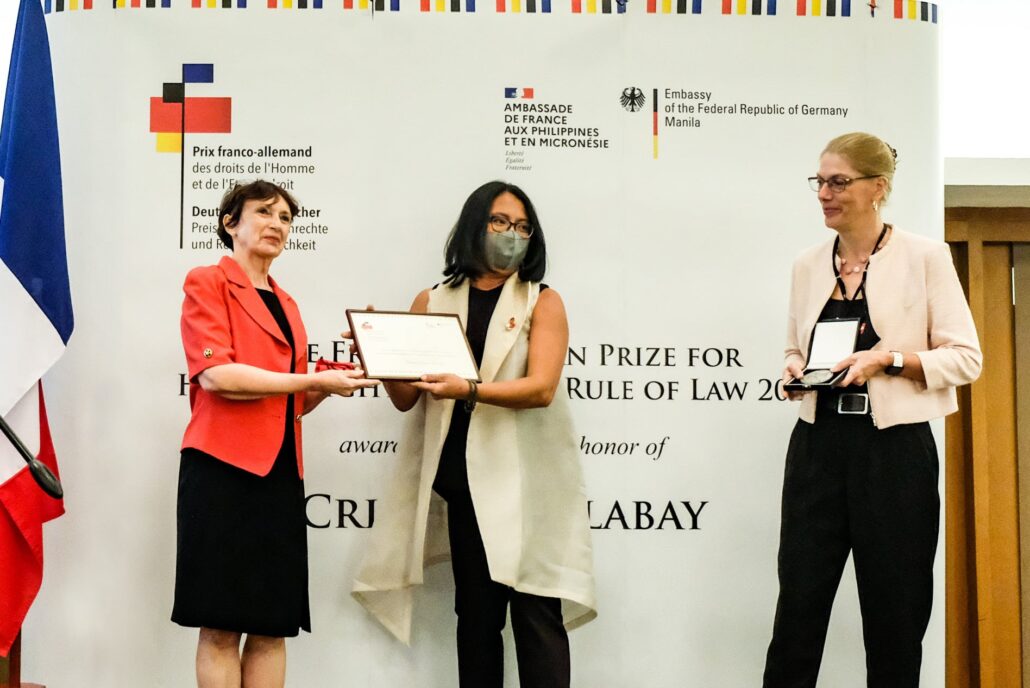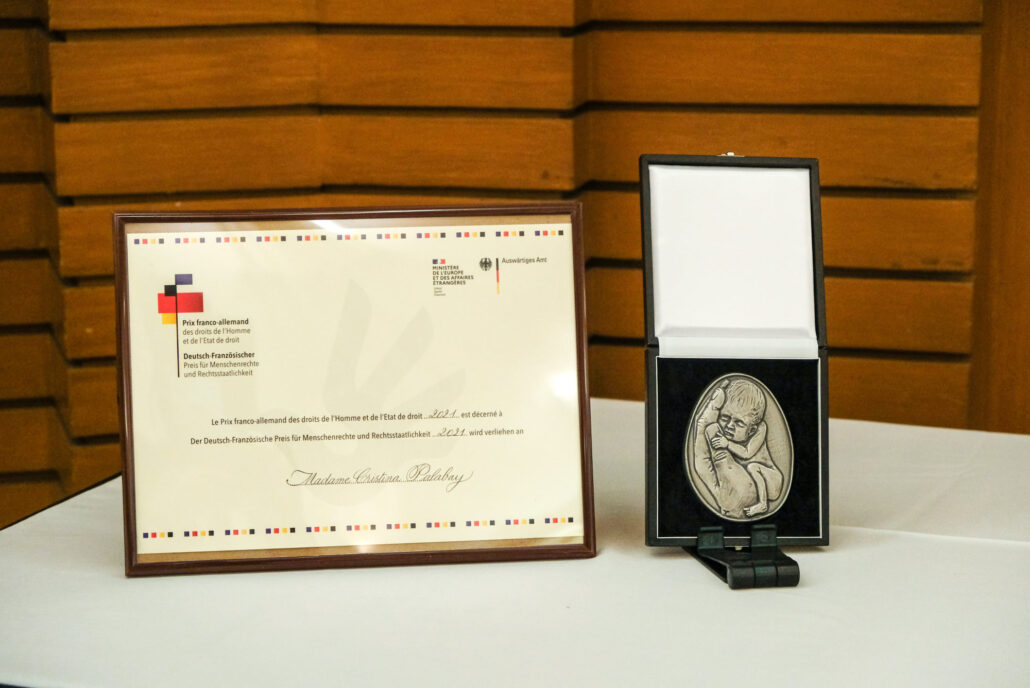Tinay Palabay wins prestigious human rights award; dedicates prize to fellow rights defenders
Karapatan’s office was busy Wednesday afternoon and people were scurrying about, as usual. But no list was being updated and no frantic calls were being made. The stacks of papers atop tables were being ignored and the placards were shoved to corners were they could not get in the way of the bustle.
The chatter was happy and the jokes came thicker and faster than usual. And instead of harried-looking human rights defenders, they looked like party-goers in their Sunday best.
In a space usually reserved for quick consultations when there are reports of arrests and killings stood a ring light beside a human rights lawyer, make up brushes in hand. Under the lights sat Karapatan’s secretary general Cristina “Tinay” Palabay being glammed up.
Downstairs came a steady procession of cars loaded with well-wishers from church and other human rights groups. They were getting ready to convoy to far-off Bonifacio Global City, an unusual destination for their type who are usually seen in rallies on streets and military and police camps.
When it was time to go, Tinay emerged smiling, every inch an international human rights laureate she was to formally become in a couple of hour’s time.
Roneo “Jigs” Clamor, Tinay’s long-time deputy secretary general, also performed an unusual role that afternoon. He drove the honoree while wearing a seldom-worn suit. Another extraordinary instance happened when they arrived at the Blue Leaf Pavilion at the swanky corner of Taguig City. “This is actually my first time to have valet parking,” he said as he passed over the car keys to the attendant.
After a brief wait at the entrance for Covid-19 health protocols, Tinay entered the hall, Marcos martial law survivors, mothers of killed and the disappeared, fellow rights defenders, and friends from student activism days in tow. They were soon joined by members of the diplomatic corps, journalists, progressive activists and candidates for various positions in the 2022 elections.

In gratitude to Tinay and Karapatan
The program started on time. French Ambassador Michele Boccoz spoke first, announcing Tinay was among the 15 recipients of the 2021 Franco-German Prize for Human Rights and the Rule of Law. Being feted in similar ceremonies across the globe were Monika Borgman (Lebanon), Narges Mohammad (Iran), Nebahat Akkoc (Turkey), Erika Aifan (Guatemala), May Sabe Phyu (Myanmar), Noelah Godfrey Msuya (Tanzania), Tabelo times (South Africa), Sharhzad Akbar (Afghanistan), Chang Weiping (China), Jacques Letang (Haiti), Alexandrine Victoire Saizonuo (Benin), Ajna Jusic (Bosnia & Herzegovina), Jake Epelle (Nigeria), and Rafael Azcategui (Venezuela).
Boccoz said that in her capacity as Karapatan secretary general, Tinay led efforts in providing legal and material assistance to political prisoners, victims, and the families of victims of torture, harassment, displacement, enforced disappearances in the Philippines.

“Cristina’s voice and that of Karapatan have remained strong and inspiring, even in the face of danger,” the Ambassador said.
Tinay was jointly nominated by the French and German Embassies in Manila “in recognition of her dedication to promoting human rights in the Philippines and globally, particularly though her advocacy work in protecting minorities, empowering women, upholding labor rights, defending freedom of the press and expression, calling for respect of international humanitarian law, as well as supporting actions for the protection and safety of human rights workers all over the world.”
“France and Germany are deeply concerned by the repression or threats to which human rights defenders are subjected to. The protection and promotion of human rights and the rule of law throughout the world remain top priorities in our two countries’ foreign policies as we strive to achieve a world that is built on peace, equality and justice. These values are at the heart of the Franco-German Human Rights Prize, which was created precisely to pay tribute to those who have devoted, and who continue to devote, their body and soul to the defense of human rights everywhere. Indeed, human rights defenders such as Cristina must be protected and supported,” Ambassador Boccoz said.
In her own speech, German Ambassador Anke Reiffenstuel said Tinay was being honored for her “courageous work to protect human rights.” She also paid tribute to Karapatan as an important partner in their work in the field of human rights, assisting victims of human rights violations and their families, documenting human rights violations, coordinating the work of human rights organizations, and engaging dialogue with government institutions.
“Dear Cristina Palabay, thank you for your unwavering commitment and dedicated work,” the envoy said.
Apostasy at the picket line
In her acceptance speech, Tinay recalled her actual “eureka moment” while still a University of the Philippines student when she decided to devote her life to social justice and peace.
“Together with some fellow students, we were then going every weekend to a picket line of striking workers, talking with them on why they are on strike, why they had such pittance for wages despite more than eight hours of work and overtime. I marveled at their clockwork discipline and unity as they took turns in cooking, discussing with wide-eyed teenagers like us, cleaning and guarding the picket line, negotiating with the private guards, the police, and their employers. And then, weeks after, I was shocked to learn that their leader was shot dead near the picket line,” Tinay narrated
Tinay said she felt the murder of a trade union leader was unacceptable. “At that moment, I told myself: no way, I cannot just go on like it’s business as usual, get married, and live a life of apathy, after seeing that those who are the lifeblood of our nation — the workers — get treated like that. Little did I know that many years after, I’d have to witness such daily fare of violence as a women’s rights activist and as a human rights worker of Karapatan, staring at and being in the eye of fascism and authoritarianism. But perhaps, more than being a witness to such pains and violence, I am inspired by the strength of those who had it worst,” she narrated.

She went on to pay tribute to mothers of the forcibly disappeared, women political detainees painfully separated from their babies because of trumped-up charges, families of victims of extrajudicial killings, human rights lawyers who continue providing legal aid to victims despite losing their colleagues and friends to assassinations, mothers of victims of President Rodrigo Duterte’s bloody drug war, and survivors of the dictator Ferdinand Marcos’ martial law. Tinay paused to ask the latter to raise their hands and for the rest of her audience to applaud them. Among them were Karapatan chairperson Elisa Tita Lubi, former social work and development secretary Judy Taguiwalo, former anti-poverty commission chairperson Liza Masa, and Makabayan chairperson and Senate aspirant Neri Colmenares.
“Every day, I am witness to the tenacity, commitment and collective strength of my fellow human rights workers from Karapatan in documenting and monitoring human rights violations and advocacy work. This tenacity and commitment were tested through the numerous attacks, threats and vilification against us, including an ongoing reprisal suit against me and my fellow officers who are here with me now,” Tinay said.
‘We are seeds’
Tinay is the third Filipina to receive the prestigious prize, after Rosemarie Trajano in 2017and Mary Aileen Bacalso in 2019. Trajano, then secretary general of the Philippine Alliance of Human Rights Advocates, was recognized for dedicating over 30 years in the defense and protection of human rights in the country, while Bacalso, secretary general of the Asian Federation against Involuntary Disappearances, for lobbying for greater national and international action against enforced disappearances and providing assistance to victims and their families.
In closing her speech, Tinay recalled the words more recently echoed by her sisters in the feminist movement: “They tried to bury us. They didn’t know we are seeds.”
“These words ring true for every persecuted activist like myself, for every peasant claiming the land on which one’s ancestors have worked on and enriched for decades, for every indigenous people who defend and protect the environment and ancestral lands, for every worker whose toil and sweat have built industries, for health workers in the frontlines of the pandemic and campaigning for healthcare for the poor, for every freedom fighter who struggle for justice and democracy. They tried to bury us — artists and journalists of our land who uphold facts, truth, and history. They tried to bury us — Filipinas who are slaying the monsters of patriarchy. They tried to bury us — human rights workers who work and struggle with communities that have been deprived of rights, freedoms, and liberties.
“They didn’t know we are seeds. The kind of seeds that grow in the most brutal environment of political storms; the kind of seeds that cry for justice, for accountability, for freedom; the kind of seeds that push through the hardest of rocks to be able to breathe the air of survival and of defiance; the kind of seeds that blossom into something that is beyond the self, into something that is cognizant of our nation’s history of struggles,” she said.

Back to work
Karapatan’s office reverted to its default mode the very next day, Thursday. The beautiful dresses and smart suits are gone, replaced by the usual political shirts. The computers were on and humming and the papers were again being sifted. Newly-freed political detainee Cora Agovida has to be assisted in her plan to sue her accusers, more than 700 political prisoners are still in prison for their beliefs and activism, and Johanna Abua must be accompanied in her search for her disappeared husband Steve.
Tinay was in a room somewhere in the crowded office, answering queries from a journalist. Her colleagues at the country’s busiest human rights office were again hunched over their respective tables, tallying rights violation cases and perhaps hoping there would be no new cases as the year closes. It is to them, her colleagues, that she dedicated the honor the night previous.
“I, we, stand with all of you today — unburied by those who wanted to take life and our rights away from all of us. This recognition, the Franco-German Human Rights Prize and the Rule of Law, is not only for me: it is for each and every person who believes in defending and advancing people’s rights,” she said. # (Raymund B. Villanueva)
